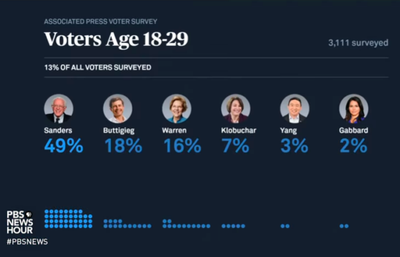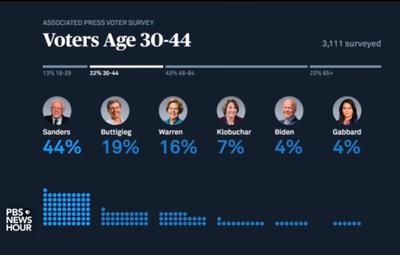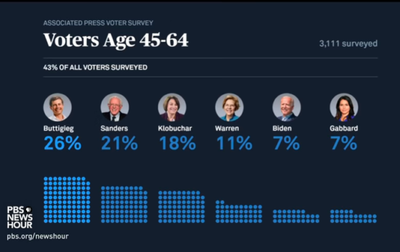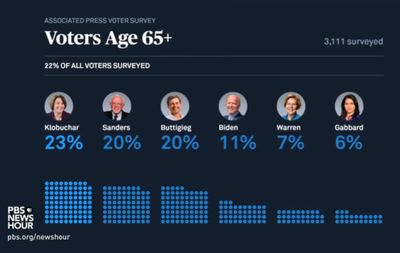Democratic U.S. presidential candidate Senator Bernie Sanders addresses supporters at his New Hampshire primary night rally in Manchester, N.H., Feb.11, 2020. REUTERS/Mike Segar
Directions : Read the summary, watch the video and answer the questions. You can turn on the "CC" (closed-captions) function and read along with the transcript here . STOP video at 6m:15s for time's sake. Summary: In a very close New Hampshire primary on Tuesday, Sen. Bernie Sanders was declared the winner, followed by Pete Buttigieg and Sen. Amy Klobuchar. Sen. Elizabeth Warren came in fourth and former Vice President Joe Biden came in fifth. Andrew Yang announced that he would suspend his campaign after a second disappointing finish following Iowa. Sanders continues to do well with voters of all ages, but stands out with his support among young people.



- Focus question : How much do primaries matter in the electoral process?
- What is the purpose of the primary system? What is the difference between primaries and caucuses?
- (If you have not already discussed the primary process in class, be sure to allow students to conduct some research on the process.) Does the primary system seem fair to you? Why or why not? What are some issues that seem problematic? How could they be addressed?
- How do you think age influences voting behaviors? Why do you think Sen. Sanders is doing so well among young voters?
- Who would you support if you could vote or if you were of voting age? Explain why.
-
Media literacy
: Check out headlines from a few different news outlets following the New Hampshire primary. What do you notice about them? How do they cover certain candidates? Do you think the coverage is fair? Explain.
- Then look up coverage of the upcoming Nevada caucuses and the South Carolina primaries. Do you see any patterns? What are they? What is the tone of the headlines and articles? (BuzzFeed, Washington Times, Los Angeles Times, The Young Turks, Wall Street Journal, CNN and Fox).
Extension activities
-
Tuesday's New Hampshire primary was another big night for former South Bend Mayor Pete Buttigieg, who came in a close second. But can he compete in more diverse key states like South Carolina, where his poll numbers are low? Buttigieg sat down with Judy Woodruff the morning after to discuss what distinguishes him from other candidates, as well as one critique of his fundraising. Watch the interview
here
(transcript
here
).
- Ask your students these media literacy related questions: What data was used in the story to support the headline "Buttigieg: Results are proving to S.C. voters he's 'a serious contender'"? What did you learn about Buttigieg's policy issues? What questions would you have asked Buttigieg?
-
How 2020 Democrats are positioning themselves after New Hampshire With the Iowa caucuses and the New Hampshire primary over, 2020 Democrats are looking ahead to states including Nevada and North Carolina.
- Check out these two Student Voice pieces on the Iowa caucuses and the primaries!
For "Super Civics 2020" updates containing resources for teachers and students on Election 2020, sign up here . Sign up for short education highlights from the PBS NewsHour here .


